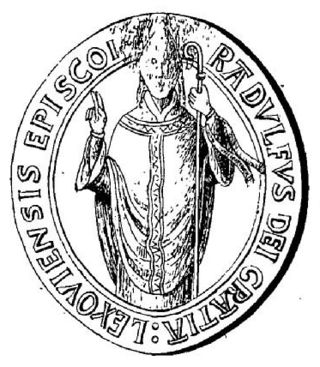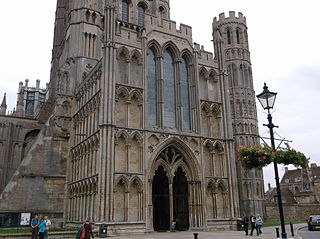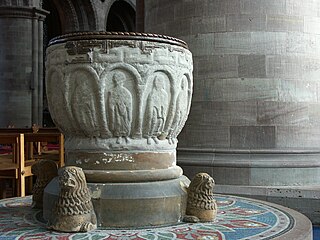Related Research Articles

Ralph de Warneville was the twentieth Lord Chancellor of England as well as later Bishop of Lisieux in Normandy.
Geoffrey was an illegitimate son of King Henry II of England who became bishop-elect of Lincoln and archbishop of York. The identity of his mother is uncertain, but she may have been named Ykenai. Geoffrey held several minor clerical offices before becoming Bishop of Lincoln in 1173, though he was not ordained as a priest until 1189. In 1173–1174, he led a campaign in northern England to help put down a rebellion by his legitimate half-brothers; this campaign led to the capture of William, King of Scots. By 1182, Pope Lucius III had ordered that Geoffrey either resign Lincoln or be consecrated as bishop; he chose to resign and became chancellor instead. He was the only one of Henry II's sons present at the king's death.

Eustace was the twenty-third Lord Chancellor of England, from 1197 to 1198. He was also Dean of Salisbury and Bishop of Ely.
Henry Wingham was a Lord Chancellor of England and Bishop of London.
John Chishull or John de Chishull was Lord Chancellor of England, Bishop of London, and Lord High Treasurer during the 13th century. He also served as Dean of St Paul's.

Reginald Fitz Jocelin was a medieval Bishop of Bath and an Archbishop of Canterbury-elect in England. A member of an Anglo-Norman noble family, he was the son of a bishop, and was educated in Italy. He was a household clerk for Thomas Becket, but by 1167 he was serving King Henry II of England. He was also a favourite of King Louis VII of France, who had him appointed abbot of the Abbey of Corbeil. After Reginald angered Becket while attempting to help negotiate a settlement between Becket and the king, Becket called him "that offspring of fornication, that enemy to the peace of the Church, that traitor." When he was elected as a bishop, the election was challenged by King Henry's eldest son, Henry the Young King, and Reginald was forced to go to Rome to be confirmed by Pope Alexander III. He attended the Third Lateran Council in 1179, and spent much of his time administering his diocese. He was elected Archbishop of Canterbury in 1191, but died before he could be installed.

The Bishop of Ely is the ordinary of the Church of England Diocese of Ely in the Province of Canterbury. The diocese roughly covers the county of Cambridgeshire, together with a section of north-west Norfolk and has its episcopal see in the City of Ely, Isle of Ely in Cambridgeshire, where the seat is located at the Cathedral Church of the Holy Trinity. The diocesan bishops resided at the Bishop's Palace, Ely until 1941; they now reside in Bishop's House, the former cathedral deanery. Conway became Bishop of Ely in 2010, translated from the Diocese of Salisbury where he was Bishop suffragan of Ramsbury.
William of Bitton was a medieval Bishop of Bath and Wells.
William of March was a medieval Treasurer of England and a Bishop of Bath and Wells.
Simon of Wells was a medieval Bishop of Chichester.

Robert Foliot was a medieval Bishop of Hereford in England. He was a relative of a number of English ecclesiastics, including Gilbert Foliot, one of his predecessors at Hereford. After serving Alexander, Bishop of Lincoln as a clerk, he became a clerk of Henry of Blois, the Bishop of Winchester and brother of King Stephen of England. He attended the Council of Reims in 1148, where another relative, Robert de Chesney, was elected as Bishop of Hereford. Chesney then secured the office of Archdeacon of Oxford for Foliot.
William de Blois was a medieval Bishop of Lincoln. He first served in the household of Hugh du Puiset, the Bishop of Durham, then later served the household of Hugh of Avalon, Bishop of Lincoln. After Hugh's death and a two-year vacancy in the see, or bishopric, Blois was elected to succeed Hugh in 1203. Little is known about his episcopate, although 86 of his documents survive from that time period. He died in 1206 and was buried in his cathedral.
Henry of Lexington was a medieval Bishop of Lincoln.
Richard of Gravesend was a medieval Bishop of Lincoln.
John Dalderby was a medieval Bishop of Lincoln.
Richard de Belmeis was a medieval cleric, administrator and politician. His career culminated in election as Bishop of London in 1152. He was one of the founders of Lilleshall Abbey in Shropshire.
William of Sainte-Mère-Église was a medieval Bishop of London.
Charles Booth, D.C.L. was a sixteenth-century clergyman who served as the Bishop of Hereford from 1516 to 1535.
Burchard du Puiset was a medieval Anglo-Norman clergyman and treasurer of the diocese of York. Either the nephew or son of Hugh du Puiset, the Bishop of Durham, Burchard held a number of offices in the dioceses of York and Durham before being appointed treasurer by King Richard I of England in 1189. His appointment was opposed by the newly appointed Archbishop Geoffrey, which led to a long dispute between Geoffrey and Burchard that was not resolved until the mid 1190s. After the death of Hugh du Puiset, Burchard was a candidate for the Hugh's old bishopric, but lost out in the end to another candidate. Burchard died in 1196.
Hamo was a 12th- and 13th-century English cleric. He was the Diocese of York's dean, treasurer, and precentor, as well as the archdeacon of the East Riding. His background is unknown, but he was probably a canon of the cathedral chapter at York Minster by 1171. He claimed to have been treasurer of the chapter by 1189, but did not actually hold the office until 1199. Hamo clashed with his archbishop, Geoffrey several times, and when Geoffrey died, Hamo's fellow canons were forbidden by King John of England from electing Hamo to succeed Geoffrey. Hamo died sometime after 1219, when he was last attested as holding his final office, dean.
References
- Clanchy, C. T. (1993). From Memory to Written Record: England 1066–1307 (Second ed.). Malden, MA: Blackwell Publishing. ISBN 978-0-631-16857-7.
- Fryde,E. B.; Greenway, D. E.; Porter, S.; Roy, I. (1996). Handbook of British Chronology (Third revised ed.). Cambridge: Cambridge University Press. ISBN 0-521-56350-X.
- Greenway, Diana E. (1968). "Bishops". Fasti Ecclesiae Anglicanae 1066-1300. Vol. 1, St. Paul's, London. Institute of Historical Research. Retrieved 28 October 2007.
- Greenway, Diana E. (1968). "Prebenderies: Chiswick". Fasti Ecclesiae Anglicanae 1066-1300. Vol. 1, St. Paul's, London. Institute of Historical Research. Retrieved 28 October 2007.
- Turner, Ralph V. (Autumn 1975). "Roman Law in England Before the Time of Bracton". Journal of British Studies . 15 (1): 1–25. doi:10.1086/385676. JSTOR 175236. S2CID 159948800.